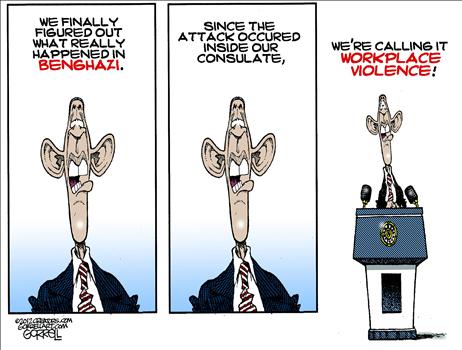The third, and final, presidential debate is tonight, and the topic is foreign policy. Most Americans, apparently, find the topic of lesser interest than domestic policy, yet is has a direct impact not only on pocketbook issues but our very survival as a nation. I guess what I’m saying is that we ought to be intensely interested in what transpires overseas.
America has always been affected by the ideologies and actions of foreign nations. In our first decade, with George Washington as president, our political scene was poisonously divided over the matter of the French Revolution. Founding Fathers who fought side by side in our war for independence accused each other of either wanting to reestablish British control over us or of seeking to set up guillotines on the street corners. It was only Washington’s steady hand and the general esteem in which he was held that got us through the crisis. It does matter who is in charge.
Closer to our day, in 1979, when Iranian radicals invaded the American embassy and took hostages, we didn’t have a strong leader. The Carter presidency shriveled under the stress and the crisis dragged out until 1981. The hostages were released on the day Ronald Reagan was inaugurated. Perhaps the Iranians had second thoughts about tangling with someone who exuded greater confidence.
One of Reagan’s signal achievements was the part he played in the demise of the Soviet Union. The pressure he put on that country via aid to Afghans who sought to remove Soviet troops from their homeland, and the announcement of his Strategic Defense Initiative (SDI) to counter Soviet missiles aimed at the U.S. pushed the Soviets to the brink of economic extinction. When he then sat down with Gorbachev, he did so from a position of strength. The Cold War, which loomed over us for four long decades, ended not with a bang but with a whimper. Today, there are monuments to Ronald Reagan throughout the old Soviet-dominated Eastern European countries.
Yes, foreign policy matters, and it also matters who is in charge of it.
The Obama campaign had hoped to capitalize on the death of Osama bin Laden and their predetermined theme that Al Qaeda was diminished and on the run. The Libya debacle capsized that strategy. If they were to admit it was terrorism, and terrorism associated with Al Qaeda, it would seriously damage their credibility in the handling of a war on terror they never liked from the beginning. Remember how they changed the wording to “overseas contingency operations”? They’ve been adept at wordsmithing all along the way. When the gunman at the Ft. Hood massacre made it evident he carried out his act because of his radical Islamic ideology, the Obama administration swept that under the rug by calling it “workplace violence,” as if Islamic terrorism had nothing to do with it. I’m surprised they haven’t yet employed that terminology to the Libyan situation.
I wonder if that’s what we will hear tonight? At the very least, Obama is going to have to explain why he and his people took so long to call the attack on the consulate and the murder of our ambassador simply a demonstration against a movie trailer hardly anyone has seen. If he tries to deny that was the case, he has history against him:
The key to this debate will be whether Romney is up to the challenge of clearly exposing this hypocrisy. There are other issues as well—our relationship with Israel, the misnamed Arab Spring, violence in the Middle East in general, the failure of the “reset” button with Russia—that also should come up.
Foreign policy is vitally important, and it’s just as important who is leading America on the world stage. We are suffering through another Jimmy Carter Moment. Will another Ronald Reagan Moment follow?


